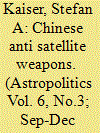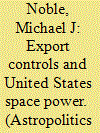|
|
|
Sort Order |
|
|
|
Items / Page
|
|
|
|
|
|
|
| Srl | Item |
| 1 |
ID:
085790


|
|
|
|
|
| Publication |
2008.
|
| Summary/Abstract |
China entered the field of space weapons with the successful anti-satellite test on 11 January 2007. National policies of spacefaring states commit to the principle of peaceful uses of outer space as enshrined in the Outer Space Treaty, but there is no detailed internationally binding regulation on anti-satellite weapons. Since 1981, the United Nations General Assembly passed annual resolutions on the Prevention of an Arms Race in Outer Space. These resolutions call for negotiations in the Conference of Disarmament for establishing an internationally binding instrument about space weapons. However, the Conference of Disarmament is deadlocked. China's weapons test has changed the power geometry. This paper examines the policy impact of the Chinese test, especially on the United States.
|
|
|
|
|
|
|
|
|
|
|
|
|
|
|
|
| 2 |
ID:
085788


|
|
|
|
|
| Publication |
2008.
|
| Summary/Abstract |
The path of gradual commercialization of current space applications, such as launch services, satellite communication services, direct broadcasting services, satellite remote sensing and navigation services, and satellite weather monitoring services, will most likely be followed by future activities of use of space resources. Ventures, like mining the natural resources of the Moon and asteroids, are likely to become technologically feasible in the near future. The question is what would be the most appropriate approach to address the future needs of exploitation of space resources: should it remain the exclusive province of state governments; should the private sector take over such space activities; or should a public-private partnership type of venture be encouraged? As state governments are becoming constrained by budget deficits, an increased reliance on private sector involvement in space activities involving the extraction and use of space resources is to be expected. When deciding whether to invest in commercial ventures of resource use exploitation, any potential private investor will be faced with the issues of economic costs, risks, and perceived regulatory barriers. This study argues that the perceived regulatory barriers, i.e., the licensing requirement, the "common heritage of mankind" principle of international space law, and protection of intellectual property rights, are not obstacles to economic development. Governments should provide both policy and regulatory incentives for private sector participation in the area of space natural resource use by funding basic research and development and by sponsoring liability insurance for private ventures among other incentives.
|
|
|
|
|
|
|
|
|
|
|
|
|
|
|
|
| 3 |
ID:
085789


|
|
|
|
|
| Publication |
2008.
|
| Summary/Abstract |
This article assesses the impact of export policy on 21st century United States space power. The efficacy of current export controls in preventing the proliferation of space technologies and maintaining United States advantage is evaluated. The study finds that space launch technology has been and remains highly globalized; the United States has lost significant international communications satellite market share, but it maintains a tangible lead in position, navigation, and timing systems; and the recent growth in foreign imaging systems, both radar and optical, have eroded any advantage the United States once enjoyed. Furthermore, export controls have not appreciably slowed the internationalization of space and breaking dependency on the United States is a common underlying theme. The paper goes on to highlight the unintended consequences stemming from current policy, including limiting access to advanced technology of foreign origin, limiting access to foreign-born expertise, and adding "fog" and "friction" to the execution of programs that include foreign content. This paper finds current export control policy is incongruent with 21st century space power programs and initiatives, such as Operationally Responsive Space, Coalition Space, and "Soft" Space Power. Export control reform is suggested herein on the basis of developing a trusted community of trading partners.
|
|
|
|
|
|
|
|
|
|
|
|
|
|
|
|
|
|
|
|
|